Capitalist Pig 4: Black Mirror, Grey Miasma of Bland Cultural Commentary
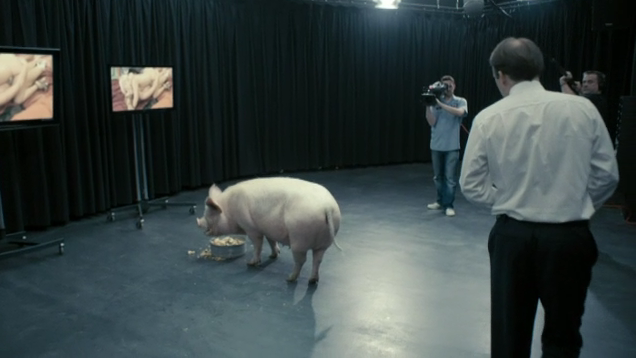 There is a moment in the first episode of Black Mirror, in which, in the midst of conjuring the future that is now our pigfucking reality, a character mentions that the Guardian has posted a brief column about the cultural significance of the pig. The script does not specify whether it is by Jonathan Jones, but it’s safe to assume that it is. Call it a headcanon, as the kids say on social media.
There is a moment in the first episode of Black Mirror, in which, in the midst of conjuring the future that is now our pigfucking reality, a character mentions that the Guardian has posted a brief column about the cultural significance of the pig. The script does not specify whether it is by Jonathan Jones, but it’s safe to assume that it is. Call it a headcanon, as the kids say on social media.
It’s a soft jab, to be sure, not least because Brooker is himself a Guardian columnist, offering such gripping insights as an unfunny ripoff of Jack’s “Tricky Dicky” series and this shitty thing about a German project to build an adaptive AI to play Super Mario World in which Brooker blatanty brainstorms for the forthcoming-to-Netflix twelve-episode third season of Black Mirror while demonstrating a complete lack of interest in any sort of material understanding of the technology he’s decided to undertake as his journalistic beat. Or perhaps more accurately a loving jab; after all, part of the heady genius of “The National Anthem” is the sublime coherence of its premise. In short, it works because the choice of fucking a pig is tremendously clever.
Well, no, that’s too simple. It works because it constrains itself to the world it’s set in. It’s still built largely out of satirical absurdism, but it keeps its excesses carefully chosen and strangely modest, and then follows them to a logical end. Put another way, it’s about a man who fucks a pig, but it takes its pigfucking seriously, not just following the premise to its inevitable and squealing conclusion but appreciably far past it as mass spectacle turns to mass horror and finally the same banal political reality that presumably preceded it.
The problem, to be blunt, comes when Black Mirror embraces technology, which it does with tedious half-heartedness. The second season episode “Be Right Back” is illustrative. In one sense it shares all the glimmering high points of “The National Anthem.” Its casting is impeccable – Haley Atwell and Domhnall Gleeson are as good a leading pair as any show has ever had. It’s gleefully high concept, revelling in rural gothic iconography and cod-Frankenstein moments. It’s emotional and clever and well-done. And literally the only thing it has to say about the world is “social media’s kind of artificial, isn’t it?”
There are two problems here. The first is that Black Mirror, and indeed Brooker’s work in general, is irksomely non-materialist in its approach to technology. The aforementioned Mario AI column is instructive. Here’s the actual paper that inspired the article. What quickly becomes apparent here is the extent to which all of the enthused talk about how the AI “experiences basic emotions, is compelled to act by urges such as “hunger” and “curiosity”, and is painfully aware that he only exists within a meaningless two-dimensional artificial framework from which he can never escape,” in fact all that’s happened is that the researchers have come up with clickbait-friendly ways to describe the process of solving Mario.…

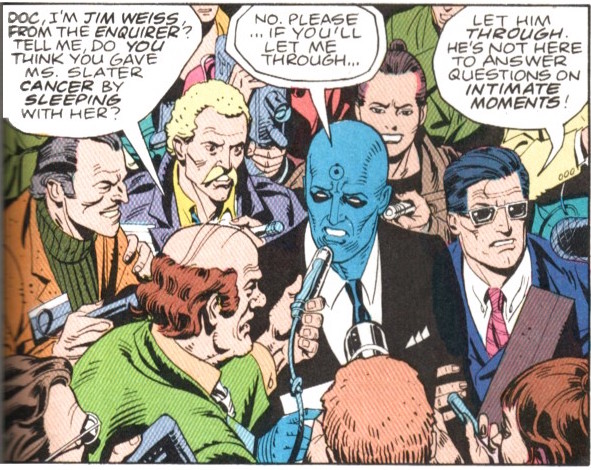 But there’s one name, of course, that’s conspicuously absent from the reactions: Moore’s. This is unsurprising; unlike Chaykin, Moore had no problem taking it personally, in no small part because it blatantly was personal. Geppi’s attack on the loose morals of American comics was specifically aimed at Moore, and blatantly accused him of corrupting the youth of America. And DC had given into the attacks without blinking an eye, then spent months dissembling about it in the face of his protests while, in his view, trying to threaten him into coming back to work for them. Indeed, in his largest single piece on the controversy, an editorial in the February 13
But there’s one name, of course, that’s conspicuously absent from the reactions: Moore’s. This is unsurprising; unlike Chaykin, Moore had no problem taking it personally, in no small part because it blatantly was personal. Geppi’s attack on the loose morals of American comics was specifically aimed at Moore, and blatantly accused him of corrupting the youth of America. And DC had given into the attacks without blinking an eye, then spent months dissembling about it in the face of his protests while, in his view, trying to threaten him into coming back to work for them. Indeed, in his largest single piece on the controversy, an editorial in the February 13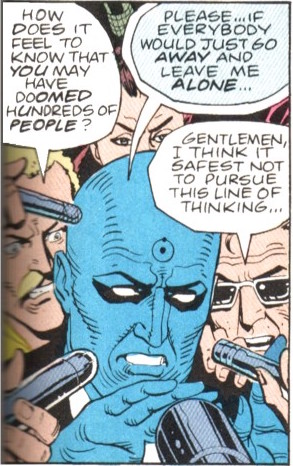 Given that these were the terms on which he viewed the debate, it’s hardly a surprise that he saw its resolution differently. This carried some risk, as Moore put it, of him “looking like a shrill, over-reactive prima donna,” and certainly that was what DC sought to quietly paint him as, calmly explaining that, as Dick Giordano put it, the ratings system was not “a moral issue at all. It was essentially a business issue,” and complaining that “there was no way I could respond to people who were becoming so emotional about what seemed to me a very simple marketing device.”…
Given that these were the terms on which he viewed the debate, it’s hardly a surprise that he saw its resolution differently. This carried some risk, as Moore put it, of him “looking like a shrill, over-reactive prima donna,” and certainly that was what DC sought to quietly paint him as, calmly explaining that, as Dick Giordano put it, the ratings system was not “a moral issue at all. It was essentially a business issue,” and complaining that “there was no way I could respond to people who were becoming so emotional about what seemed to me a very simple marketing device.”…
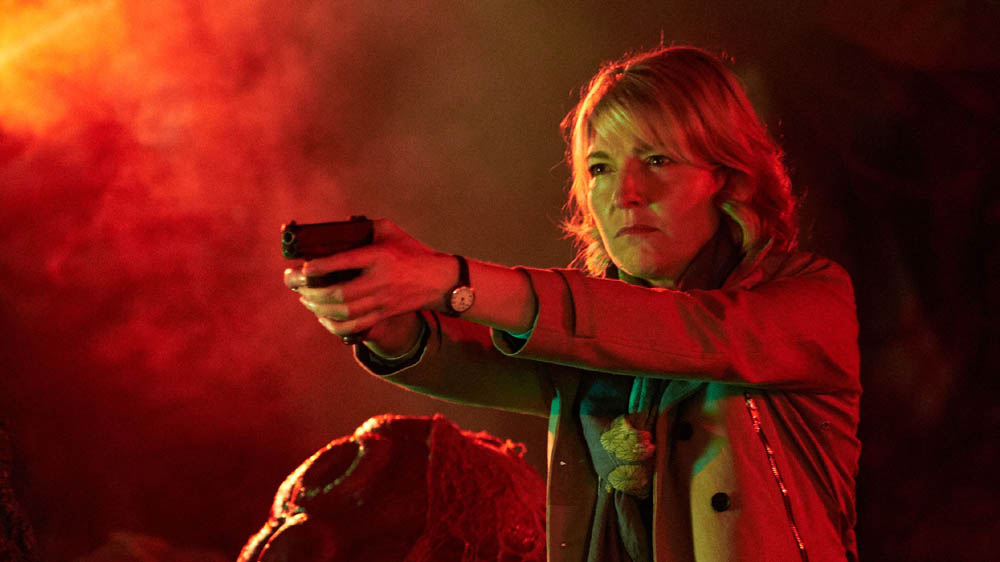 This week I’m joined by Gene Mays of the superlative
This week I’m joined by Gene Mays of the superlative 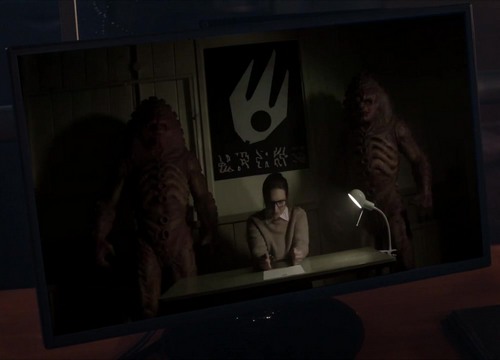 The recent Zygon two-parter (which I shall, from now on, refer to as ‘The Zygon Inv’ for convenience’s sake) by Peter Harness and Steven Moffat was an extremely well-crafted piece of television in almost every respect. Aesthetic considerations aside, it was a politically committed piece of drama which engaged with vital and loaded current issues. In many ways, it answered a call that I have repeatedly made in recent years for Doctor Who to re-engage with social and political issues, and to position the Doctor as a social actor in struggles. Moreover, it was clearly and unambiguously intended as a liberal statement of tolerance and opposition to war – a surprisingly forthright one, given the current political climate, and the current predicament of the BBC, surrounded on all sides by reactionary hounds baying for its blood.
The recent Zygon two-parter (which I shall, from now on, refer to as ‘The Zygon Inv’ for convenience’s sake) by Peter Harness and Steven Moffat was an extremely well-crafted piece of television in almost every respect. Aesthetic considerations aside, it was a politically committed piece of drama which engaged with vital and loaded current issues. In many ways, it answered a call that I have repeatedly made in recent years for Doctor Who to re-engage with social and political issues, and to position the Doctor as a social actor in struggles. Moreover, it was clearly and unambiguously intended as a liberal statement of tolerance and opposition to war – a surprisingly forthright one, given the current political climate, and the current predicament of the BBC, surrounded on all sides by reactionary hounds baying for its blood.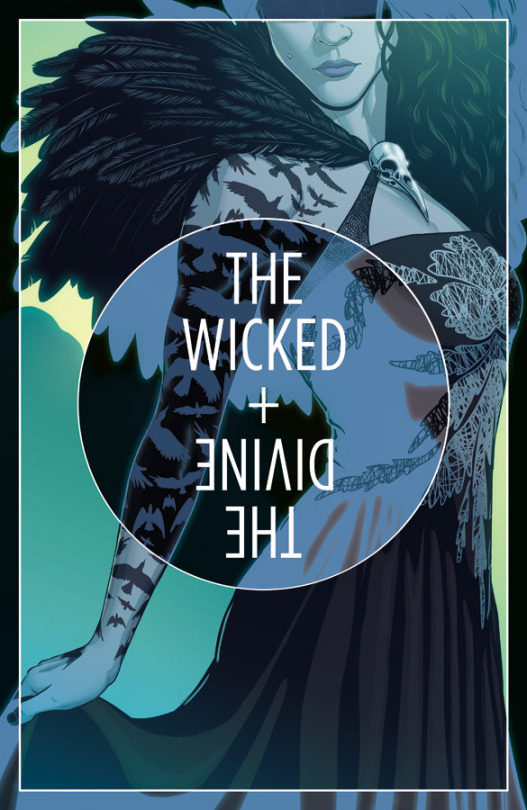 Secret Wars #7
Secret Wars #7[09-18-15].jpg)
[09-18-22].jpg) “I’m no one,” comes the reply to the older woman’s question. Which is actually a poignant answer, alchemically speaking. It can come from two different places. One place (the more likely, given this is the first movie of a trilogy) is that of the beaten ego. Someone who doesn’t believe in herself, who doesn’t give herself intrinsic value, who has given up. Let us remember, though, that “giving up” or “letting go” is a precursor to Grace. For the second place such an answer can come from is from someone who has transcended ego. Who has left it behind, who has found a certain kind of emptiness inside such that space has been made to let something else in (i.e., “grace.”)
“I’m no one,” comes the reply to the older woman’s question. Which is actually a poignant answer, alchemically speaking. It can come from two different places. One place (the more likely, given this is the first movie of a trilogy) is that of the beaten ego. Someone who doesn’t believe in herself, who doesn’t give herself intrinsic value, who has given up. Let us remember, though, that “giving up” or “letting go” is a precursor to Grace. For the second place such an answer can come from is from someone who has transcended ego. Who has left it behind, who has found a certain kind of emptiness inside such that space has been made to let something else in (i.e., “grace.”) The structure of the trailer reinforces this reading. It begins by strongly focusing on three individuals. First there’s Rey, the young woman we’ve briefly discussed. Next up is Finn, who’s on an entirely different spiritual journey. “I was raised to do one thing,” he says. “I’ve got nothing to fight for.” We see him crash land on a desert planet, presumably Rey’s. And it’s an interesting twist, in that what’s been a minor stock character – the Stormtrooper – is now made into a full-fledged character. Here’s the redemption story.
The structure of the trailer reinforces this reading. It begins by strongly focusing on three individuals. First there’s Rey, the young woman we’ve briefly discussed. Next up is Finn, who’s on an entirely different spiritual journey. “I was raised to do one thing,” he says. “I’ve got nothing to fight for.” We see him crash land on a desert planet, presumably Rey’s. And it’s an interesting twist, in that what’s been a minor stock character – the Stormtrooper – is now made into a full-fledged character. Here’s the redemption story.
 …and Zygons.
…and Zygons.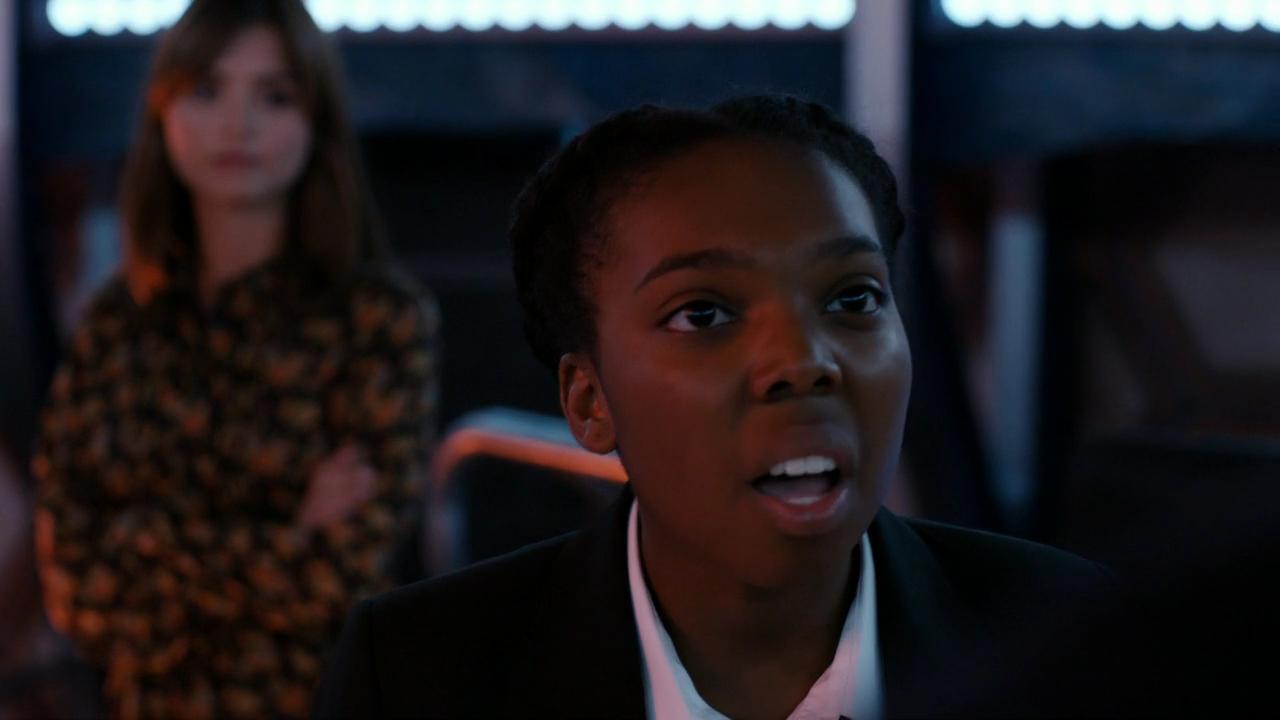 After the credits we begin at Coal Hill (love the alchemical implication of the nigredo stage of the Great Work in the name of that school) where Clara talks to the Doctor about Courtney. Courtney, who’s already in the TARDIS, ready to go on an adventure, armed with motion-sickness wristbands and a bottle of disinfectant in case she still gets sick. In these opening moments, then, we have an invocation of Children’s Television.…
After the credits we begin at Coal Hill (love the alchemical implication of the nigredo stage of the Great Work in the name of that school) where Clara talks to the Doctor about Courtney. Courtney, who’s already in the TARDIS, ready to go on an adventure, armed with motion-sickness wristbands and a bottle of disinfectant in case she still gets sick. In these opening moments, then, we have an invocation of Children’s Television.…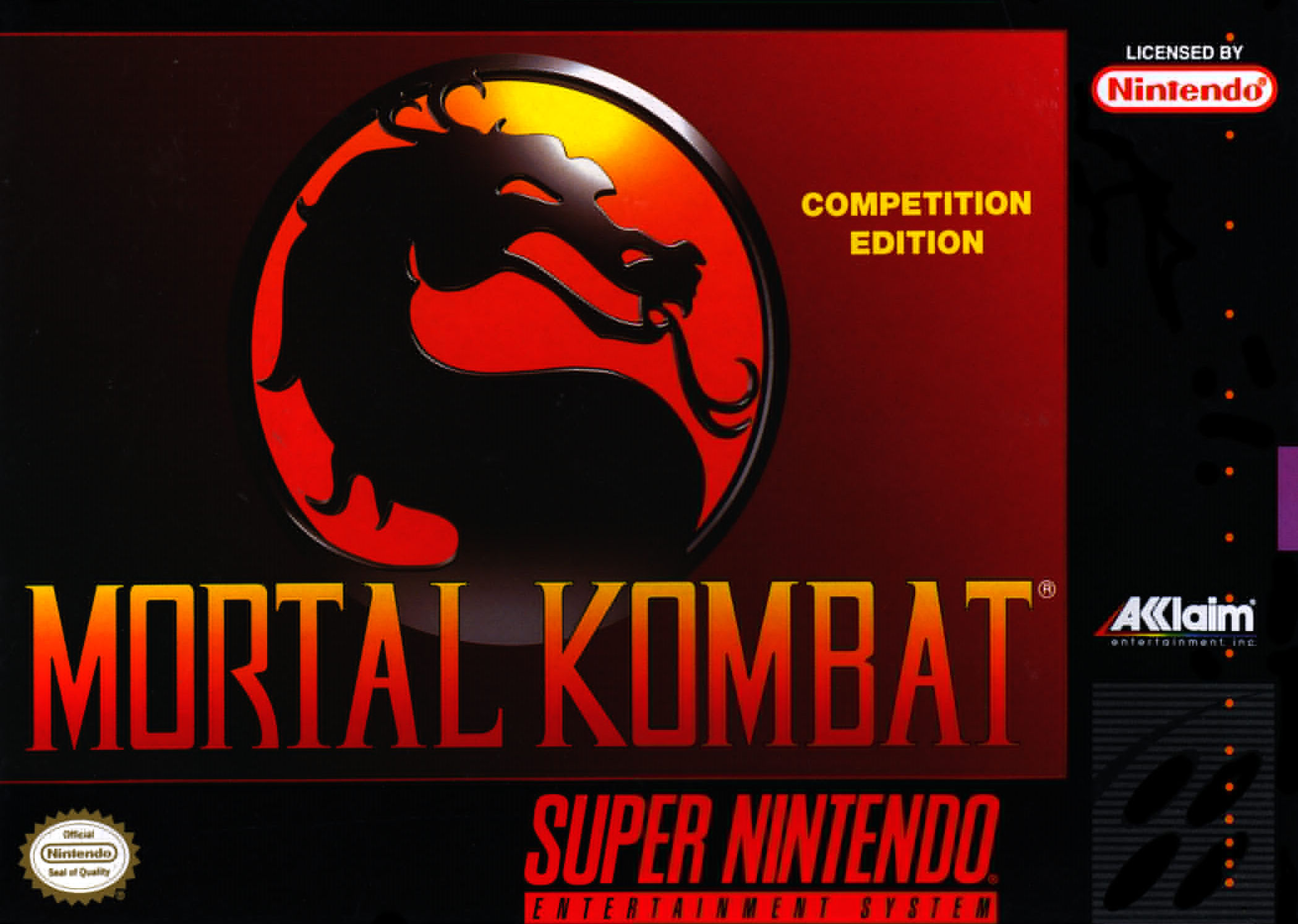 On September 13th, 1993, exactly four days after my eleventh birthday, the world slipped forever from my grasp. As with anyone for whom this happens, my reaction at the time was little more than a vague annoyance and sense of disapproval. I really never played
On September 13th, 1993, exactly four days after my eleventh birthday, the world slipped forever from my grasp. As with anyone for whom this happens, my reaction at the time was little more than a vague annoyance and sense of disapproval. I really never played